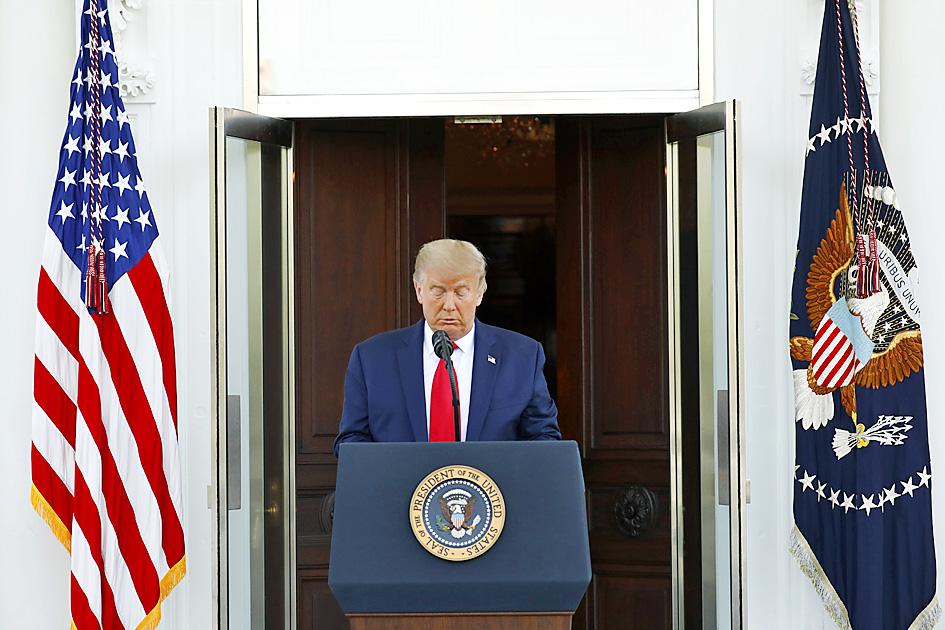US President Donald Trump said that he intends to curb the US economic relationship with China, contrasting himself with former US vice president Joe Biden, the Democratic presidential nominee, by threatening to punish any US companies that create jobs overseas and to forbid those that do business in China from winning federal contracts.
“We’ll manufacture our critical manufacturing supplies in the United States, we’ll create ‘made in America’ tax credits and bring our jobs back to the United States, and we’ll impose tariffs on companies that desert America to create jobs in China and other countries,” Trump said at a White House Labor Day news conference, where he complained at length about Biden.
“If they can’t do it here, then let them pay a big tax to build it someplace else and send it into our country,” he said of US corporations. “We’ll prohibit federal contracts from companies that outsource to China and we’ll hold China accountable for allowing the virus to spread around the world.”

Photo: Bloomberg
Trump has recently entertained the idea of “decoupling” the US economy from China, a dream of the US’ China hawks.
“So when you mention the word decouple, it’s an interesting word,” Trump said. “We lose billions of dollars and if we didn’t do business with them we wouldn’t lose billions of dollars. It’s called decoupling, so you’ll start thinking about it.”
“Whether it’s decoupling or putting massive tariffs on China which I’ve been doing already,” he said. “We’re going to end our reliance on China because we can’t rely on China and I don’t want them building a military like they’re building right now, and they’re using our money to build it.”
Trump did not say when he would implement the policies, but framed the moves as part of a second-term agenda.
“If Biden wins, China wins because China will own this country,” Trump said. “It’s the most important election in our history, right now, most important election in our history. Under my administration we will make America into the manufacturing superpower of the world and we’ll end our reliance on China once and for all.”
Biden has turned the argument against the president, accusing Trump of being soft on China to secure a so-called “phase one” trade deal in January and only toughening his posture after his administration lost control of the COVID-19 pandemic.
He has said the trade deal is “unenforceable,” and “full of vague, weak, and recycled commitments from Beijing.”
Analysts have said that the two countries’ economies are so intertwined as to make decoupling impractical.
Additional reporting by Reuters

CHAOS: Iranians took to the streets playing celebratory music after reports of Khamenei’s death on Saturday, while mourners also gathered in Tehran yesterday Iranian Supreme Leader Ayatollah Ali Khamenei was killed in a major attack on Iran launched by Israel and the US, throwing the future of the Islamic republic into doubt and raising the risk of regional instability. Iranian state television and the state-run IRNA news agency announced the 86-year-old’s death early yesterday. US President Donald Trump said it gave Iranians their “greatest chance” to “take back” their country. The announcements came after a joint US and Israeli aerial bombardment that targeted Iranian military and governmental sites. Trump said the “heavy and pinpoint bombing” would continue through the week or as long

TRUST: The KMT said it respected the US’ timing and considerations, and hoped it would continue to honor its commitments to helping Taiwan bolster its defenses and deterrence US President Donald Trump is delaying a multibillion-dollar arms sale to Taiwan to ensure his visit to Beijing is successful, a New York Times report said. The weapons sales package has stalled in the US Department of State, the report said, citing US officials it did not identify. The White House has told agencies not to push forward ahead of Trump’s meeting with Chinese President Xi Jinping (習近平), it said. The two last month held a phone call to discuss trade and geopolitical flashpoints ahead of the summit. Xi raised the Taiwan issue and urged the US to handle arms sales to

State-run CPC Corp, Taiwan (CPC, 台灣中油) yesterday said that it had confirmed on Saturday night with its liquefied natural gas (LNG) and crude oil suppliers that shipments are proceeding as scheduled and that domestic supplies remain unaffected. The CPC yesterday announced the gasoline and diesel prices will rise by NT$0.2 and NT$0.4 per liter, respectively, starting Monday, citing Middle East tensions and blizzards in the eastern United States. CPC also iterated it has been reducing the proportion of crude oil imports from the Middle East and diversifying its supply sources in the past few years in response to geopolitical risks, expanding

Pro-democracy media tycoon Jimmy Lai’s (黎智英) fraud conviction and prison sentence were yesterday overturned by a Hong Kong court, in a surprise legal decision that comes soon after Lai was jailed for 20 years on a separate national security charge. Judges Jeremy Poon (潘兆初), Anthea Pang (彭寶琴) and Derek Pang (彭偉昌) said in the judgement that they allowed the appeal from Lai, and another defendant in the case, to proceed, as a lower court judge had “erred.” “The Court of Appeal gave them leave to appeal against their conviction, allowed their appeals, quashed the convictions and set aside the sentences,” the judges